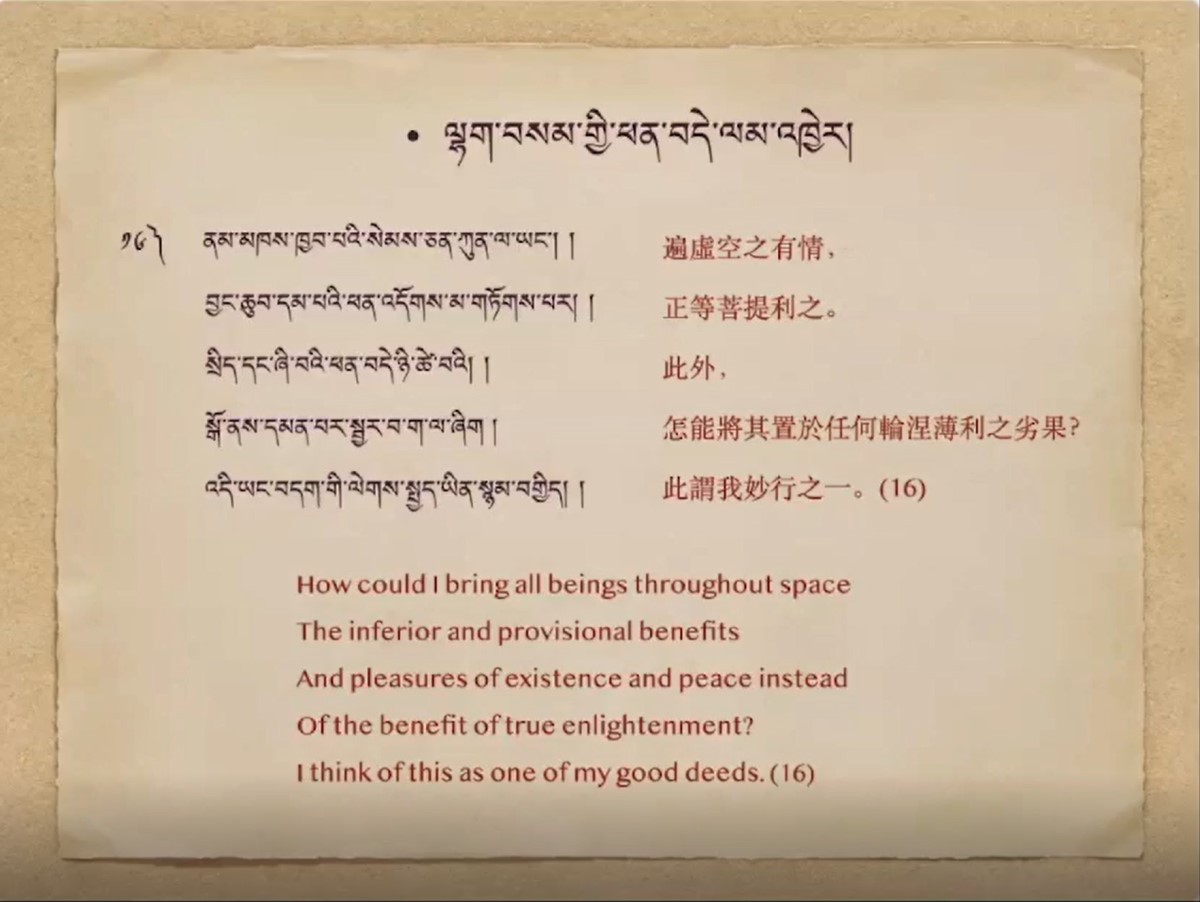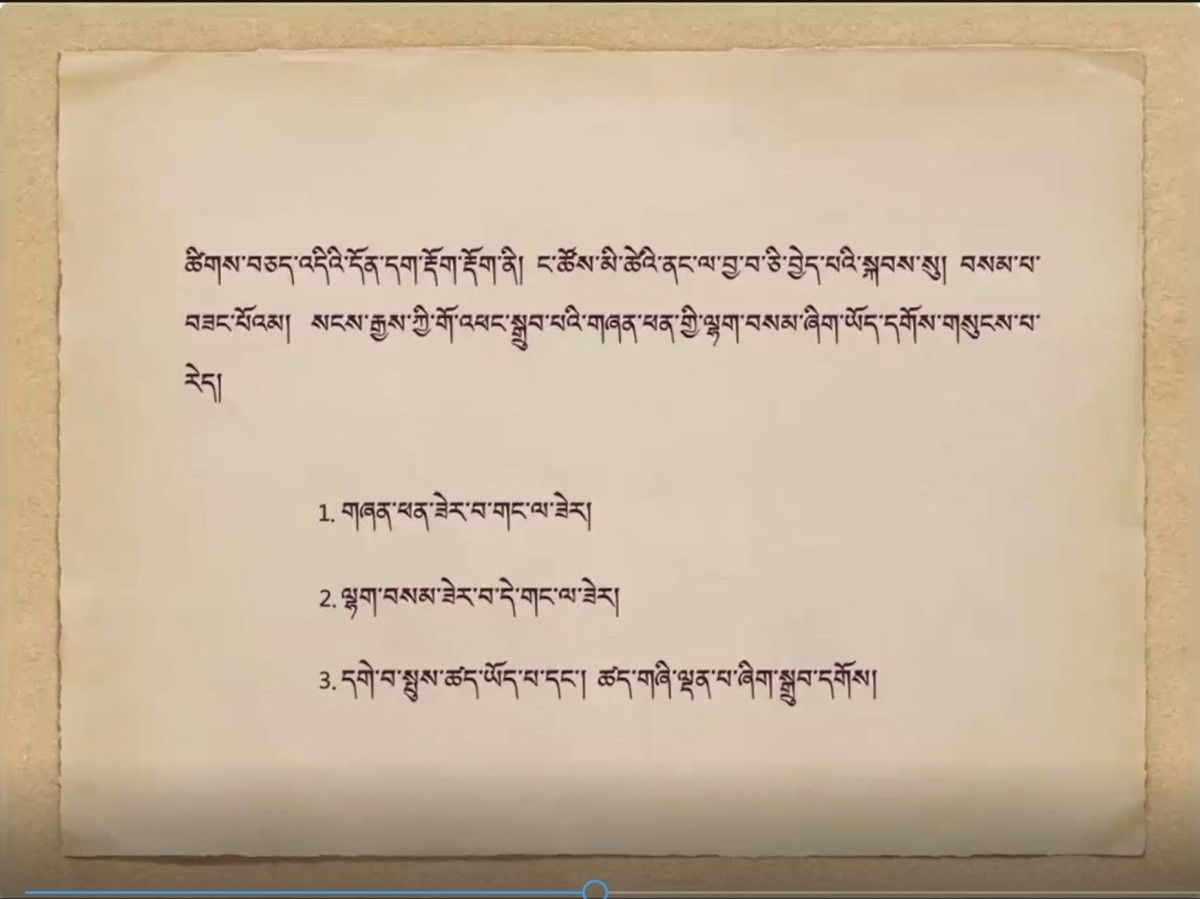法王新闻 | 2022年04月
『第7届谶摩春季』噶玛巴米觉多杰自传•第八天第一堂课
『7th Arya Kshema』AUTOBIOGRAPHICAL VERSES OF KARMAPA MIKYÖ DORJE• The 1st Session of Day 8
རྗེ་བཙུན་མི་བསྐྱོད་རྡོ་རྗེའི་རྣམ་ཐར། བདེ་བྱེད་མའི་དཔྱིད་ཆོས། ཉིན་བརྒྱད་པ།

房子造得蛮特别,屋顶是绿的!
時間:2022年04月04日 04th April, 2022 21:00-22:00(北京时间)
什么是真正的善,和“利他”
透过网路观看的善知识、僧众们,尤其是各个尼寺的尼众们,还有世界各地的法友们,藏族的朋友们,首先问候大家好!
今天是谶摩春季课程第8天,会讲法王米觉多杰《妙行自传》的第16个颂文。依照他的侍者桑杰巴珠的注解的科判,(放的PPT略) 观修「世俗菩提心」分为“座上”“座下”,在“座下”「转恶缘为道用」的部分有10个,前5个都讲过了,会讲到的是第6个,还有第7个。
On the eighth day of the Arya Kshema Spring Teachings, His Holiness began with the sixteenth of the good deeds from Mikyö Dorje’s Autobiographical Verses “Good Deeds.” Continuing under the sub-section “Taking adversity as the path in post-meditation”, according to the commentary by Sangye Paldrup, this stanza addresses the sixth of ten topics: “Taking the benefit and happiness of good intentions as the path”.
6. ལྷག་བསམ་གྱི་ཕན་བདེ་ལམ་འཁྱེར།
Taking the benefit and happiness of good intentions as the path
转清净心之利乐为道用

༡༦༽ ནམ་མཁས་ཁྱབ་པའི་སེམས་ཅན་ཀུན་ལ་ཡང་། ། བྱང་ཆུབ་དམ་པའི་ཕན་འདོགས་མ་གཏོགས་པར། ། སྲིད་དང་ཞི་བའི་ཕན་བདེ་ཉི་ཚེ་བའི། ། སྒོོ་ནས་དམན་པར་སྦྱར་བ་ག་ལ་ཞིག ། འདི་ཡང་བདག་གི་ལེགས་སྤྱད་ཡིན་སྙམ་བགྱིད། །
How could I bring all beings throughout space
The inferior and provisional benefits And pleasures of existence and peace instead Of the benefit of true enlightenment?
I think of this as one of my good deeds.(16)
遍虛空之有情,正等菩提利之。此外,怎能將其置於任何輪涅薄利之劣果?此謂我妙行之一。(16)
这里要做一个说明,《妙行解脱传》有一个主颂,另外有两个注解。两个注解是同一个作者,跋文也是一样的,但是内文中有一些些不同,一个是出自哲蚌寺,一个出自布达拉宫。 出自哲蚌寺的注解,当时,瓦拉纳西创古寺有出版。去年讲解这个课程的时候,就用到,之前是没有看到过。后来,又拿到了布达拉宫的注解,总之,是有些不同的,内容中有一些些差别。 (Bamboo:创古寺出版的东西,没有经过篡改、编造,Bamboo是打死都不相信的。)
这两部论中,引用到的主颂也有点不同,投影出来的主颂,依据的是《米觉多杰文集》的主颂,之后,我们可能对两个注解本做比对,再看有一些怎么样的出入。这里先做一个说明。
His Holiness noted discrepancies in both the root verse and the commentary between the versions obtained from the Drepung library (published by Vajra Vidya Institute, Varanasi) and the Potala palace, which may be examined and compared in the future.
成佛的“远因”和“正因”
Our actions need to have a good intention – the pure, altruistic intention of Buddhahood
这第16个妙行内容主要说的是,如果不帮助众生完全从轮回当中出离,安置于无上的佛果,只是暂时得到人天的果位。或者稍微好一点,得到殊胜的声闻乘的阿罗汉、 独觉果位。仅仅是这样子,都是无法满足一个具备大无畏的菩萨的心愿。同样,像法王米觉多杰这样一位具备着观音菩萨一样的悲心和勇猛的心的菩萨,这个颂文可以说, 就是他传记当中,最重要的一个妙行。他对佛教、对众生,有这样强大的亲近的心,或者说,这样巨大的热诚。
His Holiness explained: “If we are unable to dredge the depths of samsara and bring all sentient beings to the level of unexcelled buddhahood, even if we bring them to achieve the temporary pleasures of gods and humans or, even better than that, the levels of listener arhats and pratyekabuddhas, even that alone does not fulfill the intent of bodhisattvas, who have extremely great courage…” Karmapa Mikyö Dorje had the equivalent resolve of bodhicitta and courage as Avalokiteshvara and thus his greatest quality was his vastpure intentions.
就像过去,噶当派的格西仲敦巴大师就说:他的上师阿底峡尊者重来不会赞叹声闻、独觉乘。如果赞叹声闻、独觉的话,会让别人觉得,他们的果位也是很好的,觉得只要得到声闻、独觉的果位也就可以了。阿底峡尊者为了避免 让他们有这样的误解,所以,从不会赞叹声闻和独觉。
The Kadampa Geshe Tömpa said of his lama Atisha, “Atisha did not praise the listeners and pratyekabuddhas that highly”.
同样的,米觉多杰也是一样,无论众生得到多大的、暂时的幸福和快乐,他也不会给予任何的赞美和赞叹。不仅不会给予赞叹,而且, 他会对于众生得到暂时的幸福,会升起更怜悯的心。像很多人会得到一些财富,得到一些地位、名声,虽然这些人会觉得好像得到了快乐 和幸福,但是对于一个圣者——了悟“轮回是苦的”这样一个圣者来说,他们会知道,他们还是在痛苦当中,这些众生还是被烦恼跟业力所控制着, 还是没有真的得到一个解脱,所以,这些众生还是值得怜悯、值得同情的。
Similarly, Mikyö Dorje didn’t see much point in sentient beings achieving temporary happiness. Instead, he saw these beings as deserving compassion. People may view the short-term gain of resources, wealth, and pleasures as good in their own minds, but from the perspective of one who sees the nature of samsara, their situation is still suffering by nature. They are still under the control of karma and afflictions and hence deserve compassion and genuine affection.
米觉多杰在世的时候,当时藏族的社会是怎么样一个情况呢?当时有很多人,他们说自己是在利益别人,或者说,自己是一个很有远见的人。 在说自己很利益别人的人,他们是怎么做的呢?这些人是把别人的健康,或者把别人的财富,或者把别人的地位,当成是最重要的,所以,他们 想尽办法,保护、帮助那些人不要失去健康、财富和地位,他们觉得保护这些是最重要的。这些人对出家人也是一样,他们把吃的、穿的够不够, 看成是当务之急,他们会为了寺院里的出家众,没日没夜地四处去寻找施主。为了僧众的吃的、喝的去找施主,东奔西跑,最后连自己吃饭的时间都没有。 就这样终日劳碌地过了一生。有这样的一些人,他们以为这样子是在利益别人,在帮助别人,觉得自己这样是很有远见的人。有这样的一群人。
In Tibetan society during Mikyö Dorje’s lifetime, many people may have considered themselves benevolent, thinking about helping others. Some might consider preventing the loss of people’s physical well-being, health, possessions, and power to be very important, and would give as much aid as they could in those areas. Meanwhile, some might consider benefiting the Sangha to be important, but would focus on the short-term needs of food and clothing, using their lives to look for sponsors for monks and nuns within monasteries.
另外还有一群人,他们觉得是利益别人,觉得自己是很有远见的人。他们是在怎么做呢?他们要想远一点,要想来世,他们是害怕恶道的。 如果来世落入到恶道的话,那是很恐怖的,会很痛苦。他们为了避免落入到恶道,所以,他们今生就会去救护一些动物的生命,疲于奔命地 到处去放生,同时,他们还在批评和诋毁那些真的在广大利益众生的其他大德们。他们会说:“一定要放生才是最重要的。”对于那些在佛教的教育和实修上, 真的在利益众生的大德们,会诋毁他们说:“这些人连放生都不做,甚至还吃肉等等。”还批评大德们,有这样的一群人。(Bamboo:哪些大德们呀?释学诚还是释永信们呀?)
Others might consider avoiding the sufferings of the lower realms in future lives to be important, and would devote themselves to protecting the lives of sentient beings, particularly animalsthrough life releases, criticizing those who work for the sake of the teachings as lacking love and affection, “They eat meat; they drink their blood”.
另外还有一群人,也是一样,说自己在利益别人,说自己很有远见,这些人是怎么做的呢?他们会觉得轮回是一点意义都没有的,生、老、病、死的痛苦真的非常恐怖,让人害怕, 他们也知道痛苦的根源来自于心,最主要来自于心中的妄念,因为妄念的浮动而造了业,而导致各种的业果。如果斩断、停止这个妄念,让妄念的续流停止的话,那么就不会 投生了,生的续流也会停止。方法是什么?什么方法可以不让妄念升起,就是了悟什么都没有的完空。所以他们就到了没有人烟的一些地方,去修持什么都没有的一种完空。 他们修持这种不究竟的完空,也让身边亲近的人去修持这种完空。还说:“我这是在说法,在利益他们,让他们得到究竟的佛果。”口头上这么说,还自己这么觉得。(Bamboo:米拉日巴(Milarepa)?)
And yet other people might consider the longer-term liberation of sentient beings to be important. “Samsara is just suffering by nature. The sufferings of birth, aging, sickness, and death are extremely terrifying and their cause comes from our minds. If we can stop the stream of conceptions and thoughts, then we can stop the accumulation of karma and its subsequent ripening. So if we can stop thoughts, we can stop the continuum of birth”, they thought. “What we need to do to stop thoughts would be to realize some pitch-black emptiness and meditate on that”. They’d go to some unpopulated empty valley and meditate on some limited blank nothingness, like the emptiness of pillars or jugs. Then they’d get others to meditate on limited emptiness too, and would say they were transmitting dharma, ripening and liberating others, bringing them to omniscience.
当时的藏传佛教,很多人说自己是在利益别人,觉得自己是个很有远见的一个人,但其实他们作为是这个样子的。
At that time in Tibet, there were many such people who said they had pure intentions for the teachings and sentient beings in the long-term, acting in such ways.
有些自认为的善行,会成为障碍成佛的因
米觉多杰是怎么样的呢?米觉多杰一心想的就是:愿一切众生得到遍知的佛果, 为了这样的目的,要我做什么,我都甘愿。除此之外,任何人天果报,还是属于轮回中的快乐,甚至是不究竟的声闻乘的涅槃的快乐,米觉多杰是一点执著都没有的。他一点也不会满足,这些也不是利益 众生最好的方式。为什么这么说呢?因为如果我们贪著了这些暂时的快乐,觉得这是最重要的事情,一心努力去追求的话,这不仅会障碍我们成佛,而且我们会为这些暂时的快乐,又再造作各种的不善业, 各种无记的业,又让我们再次落入到轮回的恶道。所以米觉多杰一心希望众生得到解脱、遍知的佛果,无论他做任何事情,都是带着这样的心去做,那些伪善的、装装样子的善行他都不会去做。
However, Mikyö Dorje believed all sentient beings must be brought to complete liberation and omniscienceand would do whatever needed to be done, would sacrifice whatever needed to be sacrificed, to achieve this. He was not satisfied with only the partial pleasures and riches of samsara and nirvana, nor was he satisfied with the partial liberation of a limited nirvana. If we are attached to mere temporary pleasures and wealth, and consider these to be important, it impedes us from attaining great enlightenment. There is also the danger that we could do unvirtuous things for the sake of this temporary human life, and then be cast back down into samsara and the lower realms. For these reasons, if Mikyö Dorje saw a situation that could bring beings to omniscience and liberation, he would take the opportunity. Yet seemingly good actions that only look virtuous on the outside, he would not do.
但是有一些人却批评米觉多杰,这些人怎么说呢?他们说:“米觉多杰啊~你的心胸太狭隘了,为什么呢?不是说,只要具备大乘的发心和回向,所有的善行都会成为成就佛果的因,不是吗?那为什么米觉多杰 您却不认为那些暂时利益众生的,给予衣食、布施东西给别人,是很重要呢?这也很重要啊!因为你只要具备了大乘发心和回向,这也可以是成就佛果的因啊!”很多人这样子去质疑米觉多杰。 部分来说,他们说的也对。因为一般来说,成佛的因有两种,一种是远因;一种是深因,或者正因。但是,有的时候,属于“远因”的这种善,如果你去做了,或者你太重视“远因”的这种善的话,可能会对于 你的“正因”带来障碍。所以,“远因”的这种善还是要做,但如果把“远因”的善看做是唯一重要的修持的话,那就是不善巧的一个菩萨,对于菩萨利他事业会造成伤害。
Some people criticized Mikyö Dorje, “Your ideas are too limited. If embraced by the Mahayana resolve of bodhicitta and dedications, whatever virtue you do becomes a cause of great enlightenment. So you should consider the temporary benefit of giving food, clothing, and so forth to be important and a possible cause of great enlightenment and omniscience”. In one aspect it’s true: There are distant causes and direct, substantial causes of omniscience, His Holiness commented. However there is no certainly that actions that are distant causes will lead to enlightenment and they can actually obstruct working at the direct causes. If you are a bodhisattva who is not skilled in means, focussing on the distant causes may adversely affect the activity of the buddhas and bodhisattvas.
这就像是什么呢?就像是一个很有经验的医生,一个很有智慧的良医吧,总之医术非常好,如果是藏医的话,特别会把脉,会给药等等,他也能很准确地说出病因的这样一位良医。因为有些病看起来又有点 像是热病,但有些又像是冷的病,热病就像是中暑。举例来说,一个得了热病,一个中暑的人,他口渴的话,怎么办?这时候你不能给他酒,因为如果你再给他酒来解渴的话,反而会让他更热。 但有些医生就不知道,或者其他人不知道,觉得他中暑、口渴,刚好身边有酒,就给他酒来解渴,觉得也是帮助他解渴,也是好心。一个良医,知道这个原因,他会对症下药,不会随便来给药的。有的时候,如果我们太重视“远因”,反而会障碍我们成就佛果的“正因”。
For example, a skilled doctor with experience and intelligence will not give a patient alcohol, no matter how thirsty they may be. Instead, a skilled doctor who understands causes and conditions will give something genuinely beneficial.
如果我们总的来讲一下上面这个颂文什么意思的话,最主要有这几个部分。就是无论我们在生活当中,做任何事情的时候,都应该要保持一颗善心,一颗清净的心。也就是为了佛果,而去利益他人。 在这样子的思维当中,有几个关键点是我们要知道的。其中一个就是:到底什么是善心?什么叫做清净的心、崇高的心?再来,怎么做是为了佛果去利益他人。不然,只是一些相似的善,叫做“伪善”, 那就不是真的利益别人。所以,什么叫做真正的善,有这几种。
ཚིགས་བཅད་འདིའི་དོན་དག་རྡོག་རྡོག་ནི། ང་ཚོས་མི་ཚེའི་ནང་ལ་བྱ་བ་ཅི་བྱེད་པའི་སྐབས་སུ། བསམ་པ་བཟང་པོའམ། སངས་རྒྱས་ཀྱི་གོ་འཕང་སྒྲུབ་པའི་གཞན་ཕན་གྱི་ལྷག་བསམ་ཞིག་ཡོད་དགོས་གསུངས་པ་རེད།
The main point of this stanza: “In our lives, whatever action or task we are doing, we need to have a good intention – the pure altruistic intention of achieving the level of buddhahood”. Within that we need to understand three points:
这个颂文最主要有这几个部分。就是无论我们在生活当中,做任何事情的时候,都应该要保持一颗善心,一颗清净的心。也就是为了佛果,而去利益他人。在这样子的思维当中,有几个关键点是我们要知道的

- གཞན་ཕན་ཟེར་བ་གང་ལ་ཟེར།
what is meant by benefiting others, or altruism,
什么叫做“利他”; - ལྷག་བསམ་ཟེར་བ་དེ་གང་ལ་ཟེར།
what is meant by a pure intention,
什么叫做“清净的心”“善心”和“崇高的心” - དགེ་བ་སྤུས་ཚད་ཡོད་པ་དང་། ཚད་གཞི་ལྡན་པ་ཞིག་སྒྲུབ་དགོས།
what is a quality or standard of a virtue, as opposed to a pseudo-virtue.
善的质量要好;或者标准的善是什么。
什么是真正的利他
Altruism is practicing the dharma, so others achieve liberation and Buddhahood
首先,利益他人是什么意思?“利他”、“利他”是我们常常听到的,到底利他是什么意思呢?说白了,就是你希望这个人,希望他好,或者希望对他好。那么,什么叫做“为了别人好”, 什么叫“不是为了别人好”,这我们要分清楚。什么样叫做“对别人好”,可能每个人的认知和标准都不太一样。
Altruism is the aspiration to help things turn out well for other people. Firstly, we need to understand what is good and not good for others. However, people employ their own criteria according to their own ideas.
例如,有的人可能是这样想,譬如说,他自己很有钱的话,他可能就觉得 要帮助别人成为有钱人是最好。或者,有的人觉得要长命百岁是最好;或有的人觉得是要出人头地、有权有势,他自己这么觉得,那如果别人变成这样也是最好。或者,有的人觉得要能够 升天,得到成仙,是最好。总之,你会看到,“怎样叫对别人好”,每个人的想法,每个人的认知标准是都不一样的。那为什么会是这个样子呢?这是因为每个人,自己心目中的最好 都是不一样的。自己认为最好的,别人不一定这么想。For example, money, a long and healthy life, fame, self-actualized empowerment, becoming a god or sage, or any combination of these may be alternatively valued as good by different people. Moreover, what one person considers ‘good’, others do not necessarily view likewise, creating potential discord.
那样想要成为世界首富的人,他认为对别人最好的方式,可能就是让其他人也成为很有钱的人,或者成为世界首富。就有点像现在, 社会上的很多家庭的一些家长,他可能自己一辈子不是很有作为,他就把希望寄托在自己的孩子身上,他们就希望自己的孩子能有出息,然后去完成父母自己没有完成的一些梦想。 因为父母亲很大的一个期望,在孩子的身上,这也会带给孩子很多的压力跟痛苦。最主要的原因其实还是来自于父母,有时候太过于执著,觉得自己的想法是最重要的,而忽略了 孩子他的想法和感觉,或是他真的需要什么,所以,给予孩子很大的压力跟痛苦。讲回来,到底什么样才是真正的利益他人呢?最好的方法到底是什么呢?这其实比我们想象的困难,并没有那么的简单。所以,如果问问自己到底什么是最好的方法, 是想办法让别人更有钱,更有权有势,还是让人能够长寿,或是让人更有名、更有利。还是,全部都合在一起,又有权、又有钱、又长寿、又名利双收等等。还是,从佛教的角度来说, 最好的利益,就是帮助人远离三恶道,还是说,出离轮回呢?所以,我们都该问问自己,当你在要利益别人,利他之前,我们必须要搞清楚,你要怎么样利益别人。 如果自己都不清楚,想要利益别人什么,又说自己在利益别人的话,其实自己都还糊里糊涂的话,那你怎么可能真的做到“利他”呢?那是不可能的。
其实,这就回到我们前面谈的,每个人认知当中的“最好”“最有利益”都不尽相同。但是,我们从生活的经验,还有各种事件上,我们就可以知道,很多事情不见得都和我们的 想法是一致的。因为每个人觉得“最好的”都不同。然而,在真正的事情跟经验上来看,又不一定。
In addition, our own ideas may change over our lives; what we deem important when we are young may differ as we grow older, and this may further change when we are elderly. Once we achieve our wishes, they may again shift in turn. We cannot identify ultimate good.
所以,我们应该怎么办呢?我们的认知就不一定了,我们应该怎么办?我们应该保持一个谦卑,多去跟有智慧,有经验的人请懿,或者去求教,这是很重要的。从佛教来说,这个最有智慧、有经验的人, 或者说我们应该请益和求教的对象是谁呢?就是释迦牟尼佛。他所说的法,就是给予我们最好的指引。当然佛陀是2500年前的一个人,没有办法我们现在就到他面前去,然后跟他请益。我们能够 跟随、学到的是,从佛陀代代相传的、一路传承下来的——法教的传承者,也就是我们的上师,我们可以跟随这些善知识、上师去学习佛陀传承下来的智慧。佛陀是了悟了世间实相真理的大智者, 所以我们应该要去了解他是怎么说的。他是怎么说的呢?佛陀说:“对于自他最有利益的就是,佛法!”佛陀接着说:“我们需要实修佛法!”那么,我们为什么要修学佛法?目的是什么?
In Buddhist terms, is it best to liberate beings from the lower realms? Or to liberate them from samsara? To help we must know what is best for others, before we can bring about that good. Our own opinions are not necessarily correct. Thus we need to take a humble approach and consult those who have greater prajna and experience than we do. His Holiness stressed that we can look to the Bhagavan Buddha and the dharma he taught. The instructions on what to do and what not to do have been passed down from the Bhagavan Buddha to our guru or our spiritual friend, from whom we can take advice.
佛陀对这一点也说得非常清楚,佛陀说:“学佛的目的,就是为了解脱,为了成佛。”如果,你是一个相信佛的人,那我们就应该修学佛所说的,对于我们最有利益,最好的佛法。 我们就应该相信这一点:就是唯有究竟成佛,才能为自己和他人带来最大的利益。这是我们真的要相信的。当我们知道成佛是最究竟的利益,而且是最好的、利他的一个方式之后,我们就会知道什么呢? 我们自然就会知道,任何其他的帮助和利益,方法也好,目的也好,都不是最好。当然,佛法以外的其他方式都不是彻底和究竟的。所以,解脱和成佛的目的很清楚之后,你这个目标定好了,清楚了, 除此之外的其他很多事情,你都不会把它当成重要的事情,因为你心中已经有了最重要的事情,所谓的“最重要”只有一个嘛!你不会有两个最重要。
佛陀说:最有帮助的,利他的方式就是佛法。利他、成佛这是最重要的。这并不是跟很多人大家共同研讨出来的一个结论,不是。这是一个了悟了世间万法实相,跟真理的大智者——佛陀证悟之后所说出来的。 如果是相信佛的人,自然就会跟随着去做。
The Buddha had the prajna of realizing the nature of the world. He said that what is most beneficial for ourselves and others is the dharma, and therefore we need to practice it. The Buddha explained that the reason for practicing dharma is to achieve liberation or the level of Buddhahood. Therefore, if we believe in the Buddha, the greatest benefit for ourselves and others is to follow this advice and develop certainty about this within ourselves. If achieving liberation and omniscience is the ultimate aim and greatest benefit, then implicitly what this teaches is that ways of helping and doing good that do not have this aim are not the best ways to help others, nor are they the ultimate benefit and happiness. Altruism is practicing the dharma, so others achieve liberation and Buddhahood. This is not a case of ordinary people discussing and debating what’s best; it is what the Buddha taught.
好,那我们就休息半个小时。
词汇
སྤུས་ཚད་质量 ཚད་གཞི་标准 ལྡན་པ་具备
Bamboo评论:有些预言,Bamboo也仔细想过,并不是真正“自利又利他”的方式。当然,很多人因为这些预言所造的恶,是必然会结果的。所谓“自作孽,不可活”也。蛤蟆精虽然面目全非地可能还活着,但生不如死吧! 李鹏死了,托人超度,也不得出地狱之苦吧!下了一盘三十年大棋,棋局虽然还如预演,但始作俑者却纷纷受报了。(2022.10.22晚于Mexico city)
Youtube 视频
